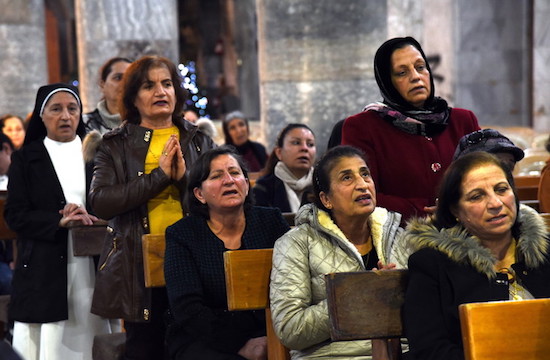Aid to the Church in Need fears the ‘disappearance’ of Christians from the Nineveh Plains
36,000 Christians still live in the Nineveh Plain in Iraq but more than a third are trying to leave. (Photo by AMMAR SALIH/EPA)
Only 45% of the original Christian community has returned to the Nineveh Plains in northern Iraq.
There were 102,000 Christians living there in 2014. But their number has dwindled to 36,000 and is expected to plummet even further by 2024.
In a report published earlier this month, the international Catholic charity, Aid to the Church in Need (ACN), says the main reasons why Christians are leaving are political instability and lack of security, as well as family and economic reasons.
Political and security instability
In the report — “Life after ISIS: New challenges to Christianity in Iraq” — ACN tries to understand the changes that could allow Christians to remain in Iraq in order to avoid a pure and simple “disappearance” of their faith communities.
ISIS occupied the Nineveh Plains for two years, but was gradually driven out beginning in 2016. Now various militias, often linked to foreign powers, have taken over much of the area.
They share responsibilities with the Iraqi army and police. During its investigation, ACN asked what priorities could convince Christians to stay in Iraq.
For 64% of them, greater security and political stability is ranked among the top three priorities. Just under a third (27%) point to religious discrimination.
A call for political action
However, security chaos is not the only reason for Iraqi Christians to emigrate. Indeed, 45% of those surveyed are unemployed.
Poor economic prospects are one of the major reasons for leaving, with 71% of unemployed Christians planning to leave the country.
“The report is not pessimistic, but it is a clear warning because without concerted and immediate political action the presence of Christians in the region of the Nineveh Plains and its surroundings will be eliminated,” says Father Andrzej Halemba, head of ACN International’s Middle East department and the person who led the survey.
Through this study, ACN is also seeking to redefine aid to Iraqi Christians based on the needs expressed.
Six years ago, the Islamic State took Qaraqosh during the night of August 6, 2014, forcing thousands of Christians into exile. At that time ACN provided emergency health and food aid, temporary housing, mobile schools and medical care.
Emigration as a new project criterion
But now the Catholic foundation is focusing on the reconstruction of Church-run facilities. But that’s not limited to church buildings and chapels.
Most of the structures that need to be rebuilt or repaired are parish halls, orphanages and health clinics.
ACN also calls on NGOs, the Catholic Church and governments to consider the impact of a project on emigration as a primary criterion for defining an action.
The foundation also calls on foreign governments to put pressure on the Iraqi authorities mired in internal divisions.
“There are a variety of political solutions,” the ACN report says, “which although challenging, will likely be better than the status quo, including an international peace-keeping force, the abolition of militias, or limited autonomy within Iraq’s federal framework.”
Aid to the Church in Need was started in 1947 to help displaced Germans after World War II and quickly refocused its efforts towards helping persecuted Christians behind the “Iron Curtain”.
It extended its mission in the 1960s to providing aid to Christians in Latin America, Africa and Asia.
Benedict XVI designated ACN a pontifical foundation in 2011.
By: Anne-Laure Juif
Source: international.la-croix.com






